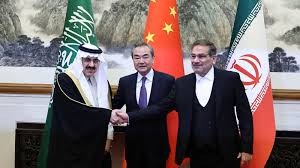April 4—Sources close to the White House report that despite his threatening, bombastic rhetoric, President Donald Trump remains committed to securing a deal on Iran’s nuclear weapons program, and ultimately a much broader understanding with Tehran that would involve its participation in a regional peace plan based upon economic development. These sources say that Trump has also secured help in this endeavor from his two potential strategic partners, Russia's President Vladimir Putin and China's President Xi Jinping, with the former actively engaged in encouraging its ally to work with Trump.
With the Butcher of Gaza, Israeli Prime Benjamin “Bibi” Netanyahu urging the U.S. to join with Israel in air strikes that would smash Iran’s nuclear capacities and “decapitate” its leadership, as Israel has done with Iran’s proxy militias Hamas and Hezbollah, the sources say that Trump rejects such ideas as “stupid” and leading to a wider war. Israeli intelligence, including the Shin Bet, whose leader Ronan Bar Bibi has tried to fire, has repeatedly denounced such plans, as has the American CIA, which says that such actions will lead to a wider and costly war. NATO and its British assets, meanwhile, have pressured for a strike on Iran, as a loud chorus of lunatic war hawks have urged that the Israelis be unleashed, with full U.S. support.
When Trump launched an air campaign against the Iranian backed Houthis in Yemen, Bibi and the NATO assets went ecstatic. When Trump said that he would hold the Iranians responsible for any missile attack the Houthis launch, and threatened to bomb Iran, these fools were drooling with the prospect of finally getting their war with Iran. But sources report that while Trump wages this bombastic and threatening public campaign, there is diplomacy going on behind the scenes, directed by Trump’s Special Envoy to the Middle East and all world trouble spots, Steve Witkoff, who, sources report, has Iran “on his plate.” These diplomatic exchanges include a March 12 letter from Trump that Witkoff had delivered to the Iranian leader, the Ayatollah Khamenei, to which the Iranians have now responded.
In the portions released to the public, Trump’s letter urged a negotiated end to Iran’s nuclear weapons ambitions, but also in broad strokes, implied that Trump was seeking to reach an understanding with Tehran which would change its role in the region and could include Iran in Trump’s larger plans for economic development as a pathway to peace. The Iranian response reportedly stresses that Iran will never negotiate under threat but is willing to pursue negotiations right now through indirect means, i.e., mediation.
Speaking last week to Tucker Carlson, Witkoff said that the President is only seeking a deal that would end Iran’s nuclear weapons program and would set up a new monitoring mechanism for the nuclear program, but that he absolutely rejects the idea of totally dismantling that program, as advocated by Bibi and NATO, and which may not even be accomplished by the war they advocate. Haaretz’s strategic analyst Ziv Bar’el reports March 30 that Trump’s letter does appear to deal with broader issues, beyond the nuclear weapons program. He says that Trump and Witkoff must deal with splits in the Iranian leadership on where Iran is going as a regional power—ideological splits between the religious/military faction and the political one: “It involves those described in the West as ‘moderates,’ such as President Masoud Pezeshkian and his supporters, who have been pressing ever since Pezeshkian assumed office for a dialogue, even a direct one, with the U.S., and the ‘conservatives,' led by Khamenei, who have adopted a tough stance of mistrust and unwillingness to resume negotiations.
“The willingness to start any dialogue, even an indirect one, could point to a real change. However, it is still unclear if such a change is intended to remove Iran's label as a recalcitrant state, thereby forging a defensive wall of international diplomacy that would counter a military operation, or whether Iran wishes to signal its willingness to reach a full diplomatic solution this time."
Bar'el points out that all previous discussion of talks with Iran included the pre-condition that sanctions be dropped. There is no mention of that in the latest Iranian response.
In addition, Bar'el reports that Iranians have told their allies and assets to refrain from any attacks on American targets, despite the bombing of Yemen. This has been confirmed by other sources, who also report that U.S. fighters have been warned to refrain from any incursions into Iran's airspace or attacks on Iranian assets in their attacks on the Houthis.
“There are reports that the U.S. have [has] asked the Iranians to see what they could do about getting the Houthis to cease their attacks on shipping lanes in the Red Sea, as well as their attacks on Israel,” a source stated. “The word back was that 'we can't control them.' They are somewhat whacky, crazy. All their attacks are doing is raising insurance rates for shipping globally, making profits for what is traditionally City of London-based financial assets. And they provide a target for those advocating a wider war.
Trump clearly believes all his public rhetoric about bombing Iran will help bring them to the negotiation table. But as Witkoff can already tell him, there is a real and dangerous limit to that process. Iran is a real challenge, and the Trump team has to learn to navigate this, if the President wants a peace deal, the which is totally opposed by Bibi and NATO.”




